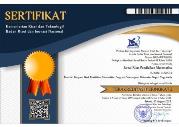Development of trigonometry module based on PBL that oriented to high school students' concept of understanding
Elly Arliani, Department of Mathematics Education, Universitas Negeri Yogyakarta Jl. Colombo No 1, Karangmalang, Yogyakarta 55281, Indonesia, Indonesia
Abstract
This study aims to produce a problem-based learning module on trigonometry oriented towards the ability to understand concepts for grade X high school students and to describe the quality of the validity, practicality, and effectiveness of the module. This is a research and development with the ADDIE model, which includes five stages: analysis, design, development, implementation, and evaluation. The implementation of product development was conducted at the State Senior High School 1 Magelang, involving 36 students from class X MIPA 2. This research resulted in a trigonometry module based on problem-based learning syntax. The module is declared valid with an average assessment of experts' content of 4.24 (valid) and media experts of 4.45 (valid). The module was said to be practical, with the average student response questionnaire result of 3.93 (sufficient), the teacher's response questionnaire of 4.00 (practical), and the percentage of learning implementation of 95.24. With Minimum Completeness Criteria of 70, the module is declared effective with an average score of 80.72 for students' concept understanding, which is high, and the percentage of completeness is 87.88, which is good. Based upon the hypothesis test with a significance level of 0.05, it shows that the average understanding of students' concepts is more than 70.
Keywords
Full Text:
PDFReferences
Anggraini, L. D. F. (2019). Geometri fraktal dan transformasi geometri sebagai dasar pengembangan motif batik sekar jagad. Transformasi : Jurnal Pendidikan Matematika Dan Matematika, 3(1), 1– 14. https://doi.org/10.36526/tr.v3i1.384
Azis, A., & Sugiman, S. (2015). Analisis kesulitan kognitif dan masalah afektif siswa SMA dalam belajar matematika menghadapi ujian nasional. Jurnal Riset Pendidikan Matematika, 2(2), 162–174. https://doi.org/10.21831/jrpm.v2i2.7331
Bussi, M. G. B., & Borba, M. C. (2010). The role of resources and technology in mathematics education. ZDM - International Journal on Mathematics Education, 42(1), 1–4. https://doi.org/10.1007/S11858-010-0234-0/METRICS
Citroresmi, N., & Suratman, D. (2016). Pengembangan modul matematika berbasis masalah untuk meningkatkan kemampuan penyelesaian masalah dan berpikir kreatif matematis siswa. Jurnal Pendidikan Dan Pembelajaran Khatulistiwa (JPPK), 5(4). https://doi.org/10.26418/JPPK.V5I4.14866
Delisle, R. (1997). How to use problem-based learning in the classroom. Association for Supervision and Curriculum Development.
Dick, W., & Carey, L. (1996). The systematic design of instruction (4th ed.). Harper Collins College Publishers.
Fahrurrrozi, & Hamdi, S. (2017). Metode pembelajaran matematika. Universitas Hamzanwadi Press. Kemendikbud. (2014). Peraturan menteri pendidikan dan kebudayaan republik Indonesia nomor 58,
tahun 2014, tentang kurikulum 2013 sekolah menengah pertama/ madrasah tsanawiyah. Kementerian Pendidikan dan Kebudayaan Republik Indonesia.
Kemendikbud. (2016). Peratutan menteri pendidikan dan kebudayaan nomor 8, tahun 2016, tentang buku yang digunakan oleh satuan pendidikan. Kementerian Pendidikan dan Kebudayaan Republik Indonesia.
Kemendikbud. (2018). Peraturan menteri pendidikan dan kebudayaan republik indonesia nomor 37, tahun 2018 tentang kompetensi inti dan kompetensi dasar pelajaran pada kurikulum 2013 pada pendidikan dasardanpendidikan menengah. Kementerian Pendidikan dan Kebudayaan Republik Indonesia.
Kemendikbud. (2019). Pusat penilaian pendidikan: capaian nasional. Kementerian Pendidikan dan Kebudayaan Republik Indonesia.
Lasmiyati, & Harta, I. (2014). Pengembangan modul pembelajaran untuk meningkatkan pemahaman konsep dan minat SMP. Pythagoras: Jurnal Matematika Dan Pendidikan Matematika, 9(2), 161– 174. https://doi.org/10.21831/PG.V9I2.9077
NCTM. (2017). Executive summary principles and standards for school mathematics. The National Council of Teachers of Mathematics.
Nelfiyanti, & Sunardi, D. (2017). Penerapan metode problem based learning dalam pelajaran Al-Islam II di Fakultas Teknik Universitas Muhammadiyah Jakarta. Spektrum Industri, 15(1), 111–119. https://doi.org/10.12928/si.v15i1.6185
Nieveen, N. (1999). Prototyping to reach product quality. In Design Approaches and Tools in Education and Training (pp. 125–135). Springer Netherlands. https://doi.org/10.1007/978-94-011-4255-7_10 OECD. (2019). PISA 2018 results combined executive summaries volume I,II,III. Organization for Economic Co-operation and Development.
Pane, A., & Dasopang, M. D. (2017). Belajar dan pembelajaran. FITRAH:Jurnal Kajian Ilmu-Ilmu Keislaman, 3(2), 333–352. https://doi.org/10.24952/fitrah.v3i2.945
Santika, F., Sowiyah, Pangestu, U., & Nurahlaini, M. (2021). School facilities and infrastructure management in improving education quality. International Journal of Research and Innovation in Social Science, 05(06), 280–285. https://doi.org/10.47772/IJRISS.2021.5612
Schunk, D. H. (2012). Learning Theories an Educational Perspective (Vol. 6th). Pearson.
Setyadi, A., & Saefudin, A. A. (2019). Pengembangan modul matematika dengan model pembelajaran berbasis masalah untuk siswa kelas VII SMP. Pythagoras: Jurnal Pendidikan Matematika, 14(1), 12–22. https://doi.org/10.21831/pg.v14i1.16771
Sudjana, D. N. (2019). Penilaian Hasil Proses Belajar Mengajar. PT Remaja.
Sugiyono. (2018). Metode Penelitian Kuantitatif, Kualitatif, dan R&D. Alphabeta Publisher.
Sultan, A., & Artzt, A. F. (2011). The Mathematics that Every Secondary Math Teacher Needs to Know.Routledge.
Sutawidjaja, A., & Afgani, J. (2014). Konsep Dasar Pembelajaran Matematika. Universitas Terbuka. Woolfolk, A. (2016). Educational Physicology. Pearson Education.
DOI: https://doi.org/10.21831/jrpm.v9i1.50119
Refbacks
- There are currently no refbacks.
Copyright (c) 2022 Jurnal Riset Pendidikan Matematika

This work is licensed under a Creative Commons Attribution-ShareAlike 4.0 International License.
Jurnal Riset Pendidikan Matematika indexed by:

Jurnal Riset Pendidikan Matematika by http://journal.uny.ac.id/index.php/jrpm/index is licensed under a Creative Commons Attribution-ShareAlike 4.0 International License.
All rights reserved. p-ISSN 2356-2684 | e-ISSN 2477-1503
View My Stats















